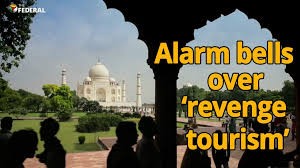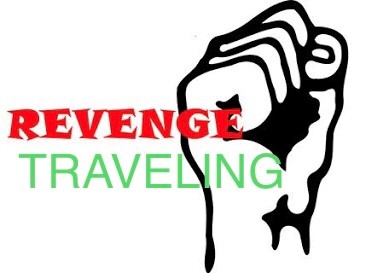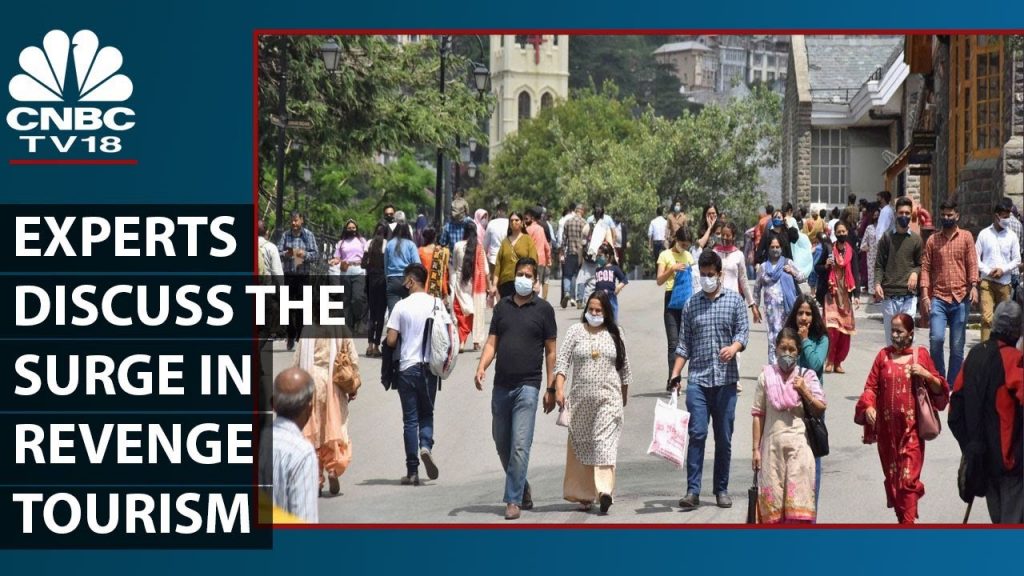The future of revenge tourism an optimistic approach.
Strange, though it may appear that a situation of ‘revenge’ needs to be deliberated upon in the wake of the present situation of crisis, (as to the question against whom should one take the revenge) The only logical interpretation of the term is inherent in the sense that people at large would avenge this situation of restriction and isolation is by way of indulging wholeheartedly into the activities related with tourism and hospitality.
 Does it mean that once COVID exits from the scene, the floodgates would be thrown open and people would head, nay, run out towards the touristic destinations of their preference as if just now released out of jails? The term revenge was coined by McKenzie who believed that this term would faithfully convey the feelings of the prospective travellers. This so called ‘’revenge’’ would start initially by exploring the domestic markets with full vigor and vivacity– this is a fact that several resource persons who were invited for webinars by the Vatel Hotel and Tourism Business School have confirmed. “All that the avid travellers haven’t been able to do and whose thirst to travel for leisure or for business has remained in-satiated, would be the first ones to indulge”
Does it mean that once COVID exits from the scene, the floodgates would be thrown open and people would head, nay, run out towards the touristic destinations of their preference as if just now released out of jails? The term revenge was coined by McKenzie who believed that this term would faithfully convey the feelings of the prospective travellers. This so called ‘’revenge’’ would start initially by exploring the domestic markets with full vigor and vivacity– this is a fact that several resource persons who were invited for webinars by the Vatel Hotel and Tourism Business School have confirmed. “All that the avid travellers haven’t been able to do and whose thirst to travel for leisure or for business has remained in-satiated, would be the first ones to indulge”
Vijesh Yoganathan, a young hospitality professional, head of APAC for the South-Eastern region of Oaky.com., based in Singapore, an advanced digital marketing and hotel room reservations company, whose business also appears to have been affected negatively by the current pandemic, in her observations about the condition says, “The opening of the situation may though instantly have people thinking about travelling but this will not result into the over-indulgence as a bit of fear and anxiety about undertaking travel would still exist”.
South-Eastern region of Oaky.com., based in Singapore, an advanced digital marketing and hotel room reservations company, whose business also appears to have been affected negatively by the current pandemic, in her observations about the condition says, “The opening of the situation may though instantly have people thinking about travelling but this will not result into the over-indulgence as a bit of fear and anxiety about undertaking travel would still exist”.
“This pandemic has had a Domino effect, a chain reaction, the outbreak of which has gradually affected each and every industry and has, for the time being, brought several economics to a complete collapse” says Vijesh.
The lockdowns were designed to not only contain but to stop the further spread of the virus. Notwithstanding the best of the efforts, the spread has been unstoppable, out of hands and totally beyond control. The absence of tourists has led to no travel, no travel to no transport, no transport to no hotels and therefore no revenues, neither any jobs, – it is like a chain reaction where one thing is leading to the downfall of the other and destroying in return, the entire system of supply-chain.
 The unexpected bulk of cancellations of bookings of rooms, travel and transport obliges the operators, in all fairness, to execute the refunds to their customers but the way in which these organisations have found a solution is to issue promissory bonds which could be redeemed for these services at a later date. Nevertheless, the tourism sector is envisaged to take a dip of more than 40% in business. “There would be a major part of customers who would not be able to redeem their credit vouchers and will have to simply let them go” says Vijesh, exuding all confidence.
The unexpected bulk of cancellations of bookings of rooms, travel and transport obliges the operators, in all fairness, to execute the refunds to their customers but the way in which these organisations have found a solution is to issue promissory bonds which could be redeemed for these services at a later date. Nevertheless, the tourism sector is envisaged to take a dip of more than 40% in business. “There would be a major part of customers who would not be able to redeem their credit vouchers and will have to simply let them go” says Vijesh, exuding all confidence.
Vijesh re-instated what the other resources have been saying that the foremost concern of travel is going to be hygiene, cleanliness and security, even if it means sacrificing to some extent and letting go the features of luxury or that of comfort. All the services that a hotel can offer will have to be leveraged around safety and security.
The hotel companies will have to introduce different buckets of pricing tailor-made to what the customer needs and not what the hotel companies have to sell. Such clients might therefore ask for an extension of the period of the promissory bonds and the hotels should also be willing and prepared to accommodate them. This will be a true test of loyalty towards the customers. For the sake of re-enforcing their customer support, the hotels will also be ready to allow early check-ins, late check-outs and upgradation in accommodation, besides offering in the range of amenities, private sanitizers and safety systems, giving sodas and pop-corns in the rooms and paying attention to values.

Be that as it may, all these services would incur an additional phenomenal cost a lot to the hotels, who then will have to make all efforts to generate the revenue and earn that “Extra Dollar” by way of cross-marketing of other products and yet making sure that no hard-selling is done.
Another avenue in which the hotels can save money is to encourage the travellers to book their rooms directly on the hotel’s own reservation systems rather than having them go through agents. Once all services are bought into place by hotels the middlemen can be eliminated. the commission part of which can be saved.
“Let us learn from what the other countries are doing”, says Vijesh, Malaysia, Singapore and Thailand have put up extremely strict and rigid systems and they have been able to win over this pandemic. Why can’t others too adopt their systems…?”
Though born and brought-up in Singapore, Vijesh has done a thorough study of tourism in the India subcontinent and sadly says that the “Trend of serious vacations still hasn’t caught on in India. It is the people of younger age who will take the first steps to travel when this pandemic dies out” it is also envisaged that the spending propensity of people will increase from the average spending of USD 160 to 178…

